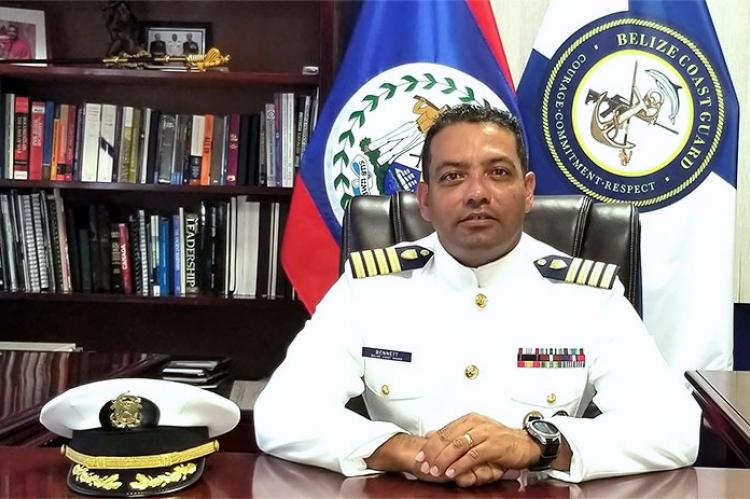Navigating Troubled Waters: Guatemalan Naval Incursion Challenges Belize’s Sovereignty
By Omar Silva
Editor: National Perspective Bz – Digital 2024
Belize City: Wednesday 18th December 2024
Another Guatemalan naval incursion into Belizean waters has reignited concerns over national sovereignty and maritime security. On the morning of November 17, a 65-foot Guatemalan Navy vessel was spotted approximately three miles south of Hunting Caye, within what Belize identifies as its territorial waters. This incident marks the second such incursion in three months, emphasizing the fragile state of relations between the two countries as they await the International Court of Justice’s (ICJ) ruling on Guatemala’s territorial claim over Belize.
Rear Admiral Elton Bennett, Commandant of the Belize Coast Guard, confirmed the encounter and described the actions taken by his patrol team. According to Bennett, the Guatemalan vessel, which appeared to be a hydrography ship, was informed that it had entered Belizean waters. After a verbal exchange, the Guatemalan Navy denied the claim, asserting that the area was Guatemalan territory. The Belize Coast Guard then escorted the vessel out of the area without any escalation. No weapons were drawn, and no aggressive actions were reported.
Protocols and Challenges
The Belize Coast Guard acted within the bounds of international maritime law by asserting Belize’s jurisdiction and avoiding unnecessary confrontation. However, this incident highlights several pressing issues:
- Undefined Maritime Borders: The maritime boundary between Belize and Guatemala has not been physically or notionally demarcated due to the ongoing ICJ case. Belize currently uses the principle of equidistance to exercise jurisdiction in its maritime space. This ambiguity allows Guatemala to contest Belize’s claims, often leading to incidents like this one.
- Coast Guard Limitations: Belize’s Coast Guard, while committed to maintaining territorial integrity, faces significant challenges. It lacks the capacity for armed confrontation and relies heavily on diplomatic measures through the Ministry of Foreign Affairs. This underscores the need for technological advancements, such as the recently acquired drones, to enhance surveillance and monitoring capabilities.
- Guatemala’s Aggressive Posture: Despite the diplomatic agreements between the two countries, Guatemala’s continued incursions signal a disregard for Belize’s sovereignty. These actions threaten the fragile peace and undermine the confidence-building measures necessary for coexistence.
Legal Framework and International Law
Under international law, particularly the United Nations Convention on the Law of the Sea (UNCLOS), coastal states have the right to enforce sovereignty over their territorial waters, which extend 12 nautical miles from their baseline. Military vessels, however, may transit these waters under the principle of innocent passage, provided they do not engage in activities prejudicial to the peace or security of the coastal state.
Belize’s Coast Guard followed the appropriate protocols by:
- Verifying the incursion using GPS coordinates.
- Communicating with the Guatemalan vessel to assert Belize’s jurisdiction.
- Escorting the vessel out without escalating the situation.
While this approach aligns with international norms, repeated incursions highlight the limitations of diplomatic protests in preventing such incidents.
Implications for Belize’s Sovereignty
The repeated incursions by Guatemalan naval vessels raise serious questions about the effectiveness of Belize’s current strategy. Allowing these incursions to go unchallenged beyond diplomatic protests could weaken Belize’s position at the ICJ and embolden further violations.
Moreover, these incidents have implications for Belize’s security and the morale of its defense forces. The Coast Guard’s professionalism is commendable, but the government must address the systemic issues limiting its operational capabilities. This includes:
- Increasing the Coast Guard’s budget for advanced surveillance technology.
- Strengthening international alliances to bolster maritime security.
- Advocating for expedited ICJ proceedings to resolve the maritime boundary dispute.
The Path Forward
As Belize awaits the ICJ’s definitive ruling, it must balance diplomacy with decisive action. This requires:
- Enhancing Surveillance: Investing in drones, radar systems, and intelligence-sharing agreements to monitor maritime activities effectively.
- Strengthening Diplomacy: Intensifying diplomatic pressure on Guatemala through international forums and leveraging support from allies.
- Public Awareness: Transparently informing Belizeans about these incursions and the government’s responses to ensure public trust and support.
- ICJ Outcome Preparedness: Developing strategies to enforce the ICJ’s ruling, including establishing clear maritime boundaries and deterring future incursions.
Conclusion
The recent Guatemalan naval incursion underscores the delicate nature of Belize’s sovereignty and the urgent need for enhanced maritime security. While the Coast Guard’s actions were professional and measured, these incidents highlight systemic vulnerabilities that must be addressed. Belize’s path forward lies in a combination of diplomatic finesse, technological investment, and public engagement to safeguard its territorial integrity until the ICJ provides a definitive resolution.
As regional tensions persist, the international community must also recognize the importance of upholding Belize’s sovereignty and supporting its efforts to resolve this long-standing dispute peacefully.
- Log in to post comments

